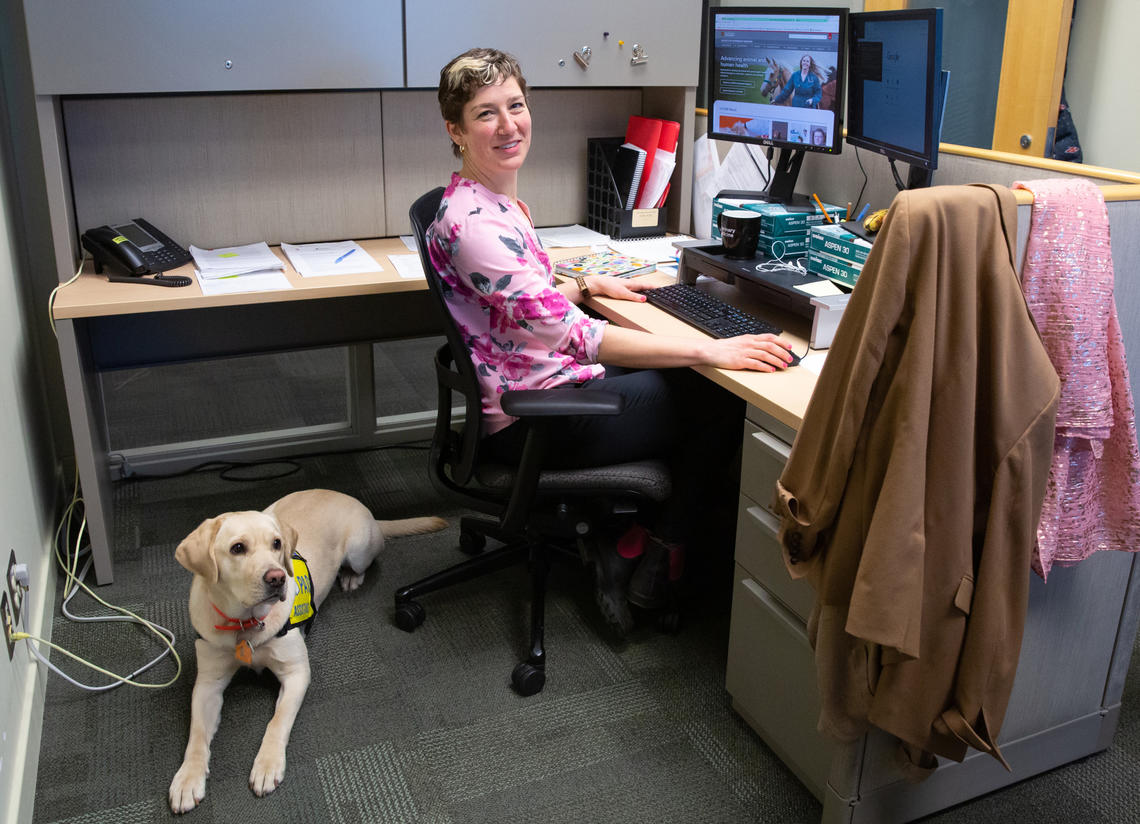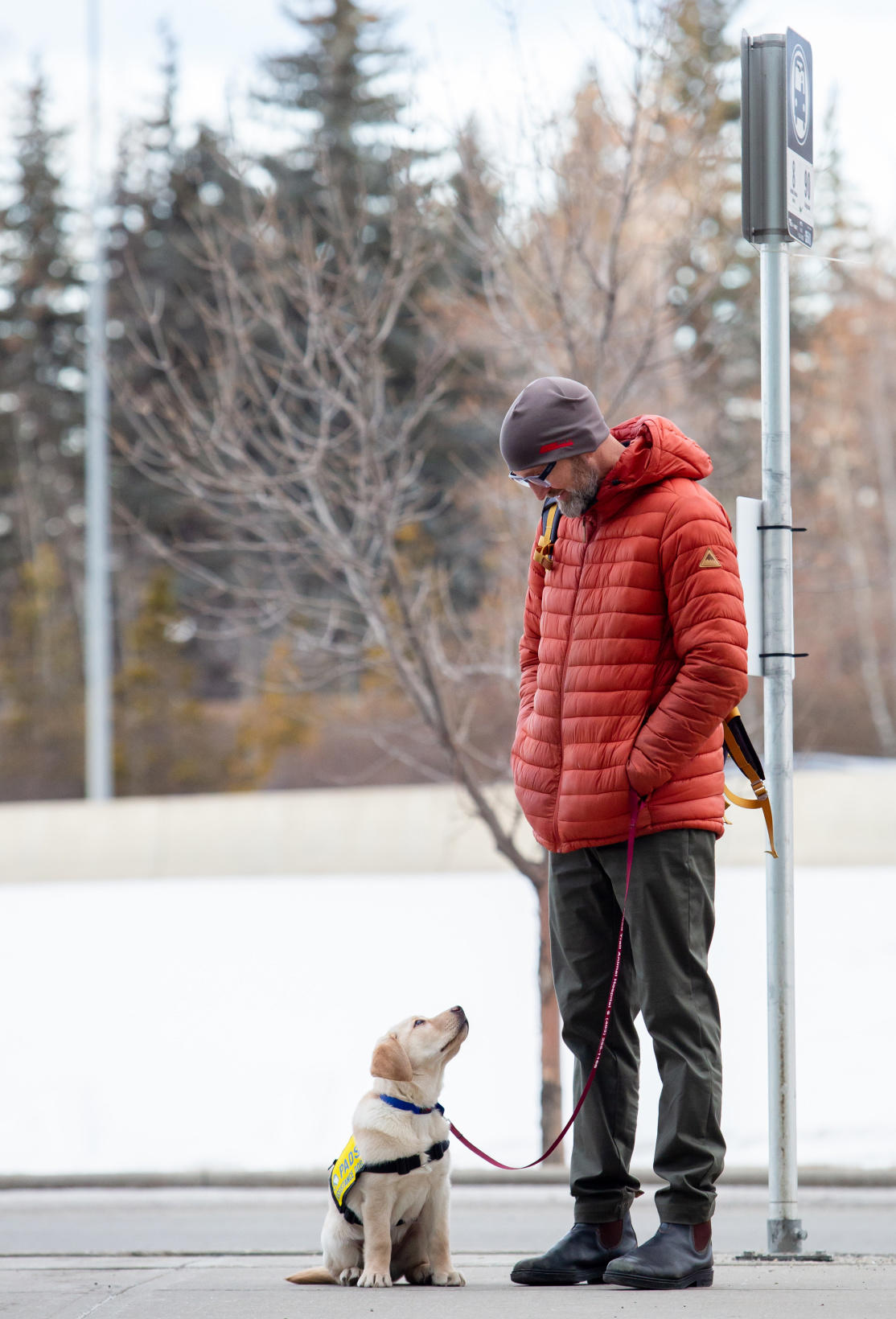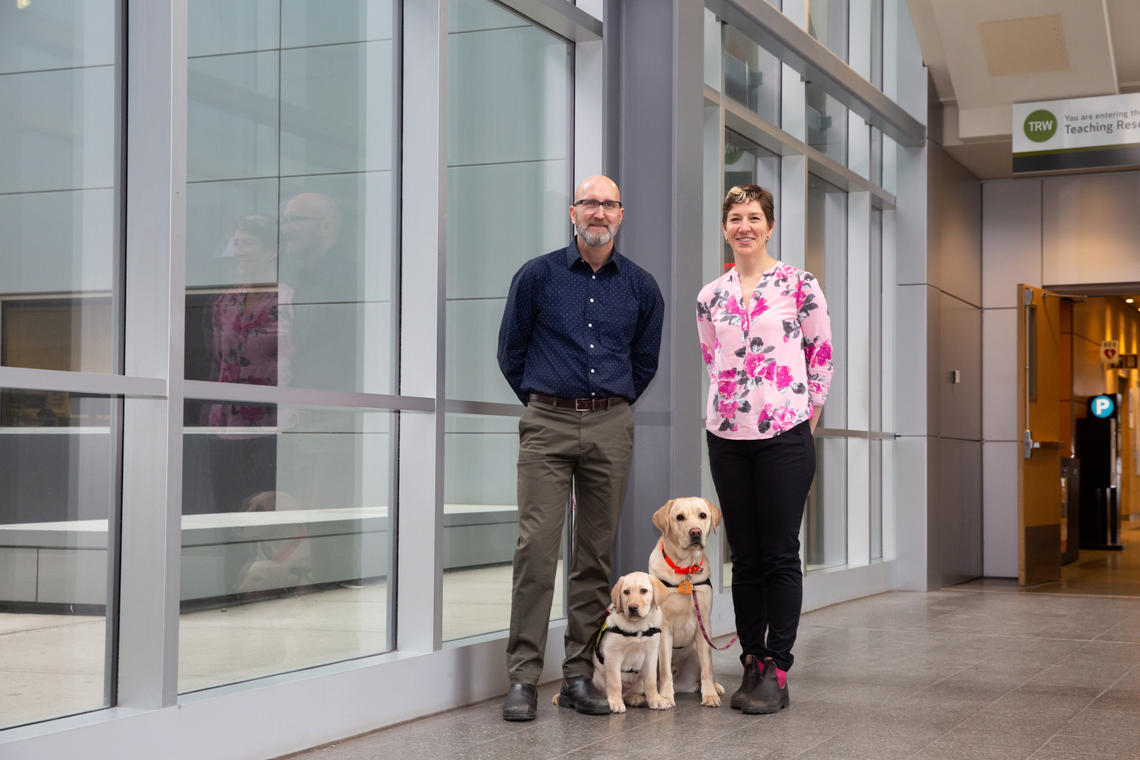Jan. 28, 2020
UCalgary employee prepares puppies for future careers as assistance dogs

Paxton loves his job. Every day, he gets up early and waits by the door until it’s time to put on his yellow assistance-dog-in-training vest and take the bus to work at the University of Calgary.
The young Labrador retriever spends his day by the desk of Madeline Kapiczowski, a project co-ordinator in the Faculty of Veterinary Medicine who is readying Paxton for his next career move — advanced training to become a certified wheelchair assistance dog.
Kapiczowski and her husband, Troy, are ‘puppy-raising’ volunteers with PADS (Pacific Assistance Dog Society) — a charitable organization that breeds, raises, and trains fully certified assistance dogs for people with physical disabilities other than blindness. The couple has had Paxton for about a year, socializing him in preparation for his working life ahead.

Part of Paxton's training includes going to work with Madeline Kapiczowski each day.
Riley Brandt, University of Calgary
“He’ll likely be going to advanced training soon,” Kapiczowski says. “There, the trainers will decide the best career for him — whether it's working with someone with a manual wheelchair or a powered chair or as a bracing dog for somebody who's a little bit more mobile.”
Twenty-one canine recruits and counting
The couple has welcomed 21 puppies into their home since they began volunteering with PADS. “Typically, we have two dogs at the same time. Troy will have one and I'll work with the other one.” All puppies come from the organization’s breeding program. They arrive two months old, ready to begin work. Their most recent recruit is 12-week-old rascal named Brew.
“They start in their little vests at eight weeks. It’s really too much. It's so cute,” Kapiczowski says with a big smile. “Right from then, we take them out in public with us. A huge part of the raising of them is just socialization. It’s about giving them the opportunity to experience different people, different places, different textures, different sounds, different smells. We teach them basic commands, but the most important part is the routine of coming to work and going out in public and experiencing all these life things. Wherever their clients may end up, they need to be able to handle it.”

Brew and Troy Kapiczowski get out and about as part of the puppy's socialization.
Riley Brandt, University of Calgary
With each new puppy, the couple attends weekly lessons with a PADS dog trainer in Calgary, who coaches both them and their dog.
“Every dog is different, so sometimes you need to change your techniques a little bit. Over all these years, you think you kind of have it figured out and then you get a new dog and it's different again. So it's a continual process of always learning.”
An exceptional, really good boy
Kapiczowski believes that while volunteers can support a dog through a lot of situations, outstanding assistance dogs have it in them to begin with.
“Paxton is a really confident dog and he’s always got energy for the job,” she says. “He's just not a worried guy. He’s not rattled by different experiences, whether it's a packed city bus or air blowing from grates or loud bangs or screaming kids. All of the kind of distractions that a dog might find unsettling, he's able to maintain his composure.”
A certified service dog’s work is demanding. Daily tasks might include opening and closing doors, turning lights off and on, retrieving a telephone or medication, carrying groceries or parcels, and picking up dropped objects such as keys. They might pull manual wheelchairs or provide stability for people with mobility issues. Kapiczowksi is certain Paxton is an ideal candidate for the job.

The Kapiczowskis with Brew and Paxton.
“Paxton is from the best of the best breeding programs and he’s had lots of exposure to different things from the beginning of his life. Those factors are contributors, but at the core of it, he's just a really exceptional, really good boy,” Kapiczowski says. “We play a small part, but mainly it’s just who he is. Now I'm going to get emotional,” she adds, eyes tearing up.
Not all puppies in the program have the right traits to succeed as a wheelchair assistance dog. “If they don't quite have the right level of confidence, they might go into different streams and work in caring and compassion roles or in the home of a family with an autistic child.” The Calgary Police Force has a couple of dogs they use in trauma situations.
Raise a puppy. Change a life
The volunteer section of the PADS website reads: Raise a puppy. Change a life. For Kapiczowski, that’s exactly what motivates her to do volunteer work that ends up each time in having to say goodbye.
“You get attached to every one of them and they’re all super special. People say ‘I don’t know how you can do it. I could never give them away,’ but for us we always just keep in mind that somebody else needs them more than we do,” Kapiczowski explains. “They really do change lives.
“I thought by this stage it would get easier but it doesn’t. As heartbreaking as it is every time, the reward is seeing them have such impact on someone's life. You’re so proud of them. And they’re never yours to start. You always know they’ll be leaving. So, we continue to love it and I think we'll keep doing this as long as we can.”





